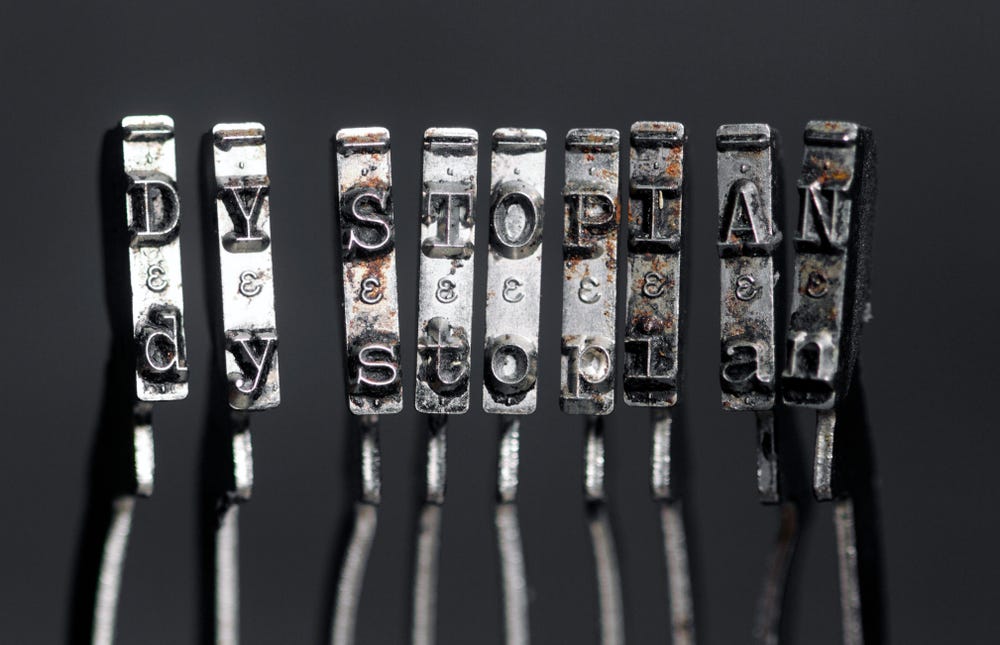E-Pluribus | June 13, 2022
Dystopian all the way down, even some on the left think "woke" has gone broke, and signs of a turning tide.
A round-up of the latest and best writing and musings on the rise of illiberalism in the public discourse:
Pamela Paul: She Wrote a Dystopian Novel. What Happened Next Was Pretty Dystopian.
In March we highlighted (in Around Twitter) the retraction of author Lauren Hough’s Lambda Prize nomination over her defense of a fellow writer. In the New York Times, Pamela Paul writes about the publication of the book at the center of the controversy and how just the hint or perception of deviation from woke orthodoxy can unleash a vitriolic backlash against even allies.
[Imagine a world] in which an author proudly announces her forthcoming novel only to be attacked online for its fantastical premise. Months before the book comes out, it is described on Goodreads as a “transphobic, racist, ableist, misogynist nightmare of a book.” On Twitter, people who have yet to read the novel declare that it’s their responsibility to “deplatform” it. When one of the author’s friends, herself a writer, defends the book, she is similarly attacked, and a prominent literary organization withdraws her nomination for a prize for her own book.
[ . . . ]
“There seems to be a misunderstanding of what fiction or literature is for,” Lauren Hough said in a phone interview. Hough — for those who didn’t brave the tempest over “The Men” on Twitter — is the author of “Leaving Isn’t the Hardest Thing,” a memoir whose Lambda Prize nomination was rescinded when she forcefully defended Newman’s novel on Twitter. “People seem to want books to be good or evil, rather than exploring a question. Now no one can play this thought experiment again.”
[. . .]
What a sour irony that a dystopian fantasy brought a dark reality one step closer. In this frightful new world, books are maligned in hasty tweets, without even having been read, because of perceived thought crimes on the part of the author. Small but determined interest groups can gather gale force online and unleash scurrilous attacks on ideas they disapprove of or fear, and condemn as too dangerous even to explore.
Read the whole thing.
Sam Adler-Bell: Unlearning the Language of ‘Wokeness’
At New York Magazine, Sam Adler-Bell dips his toe into waters that more on the left are beginning to test: is the language of the left on cultural and political issues becoming counterproductive? Adler-Bell answers with a qualified ‘yes', warning that the implied (or outright) condescension of some progressives is likely to turn off rather than convert those who are considering progressive positions.
That all being said, I want to suggest that the critique of “wokeness” may point to a real problem for socialists, feminists, and other radicals, one obscured by our disdain for its messengers and their motivations. This real problem is obscured because it overlaps, at times, with our opponents’ tendentious complaints. So we dismiss it. To elucidate it further, I’m going to offer — God, forgive me — another definition of “wokeness,” one which bears at least some resemblance to the way it is deployed in our jaundiced contemporary discourses.
Here it is: Wokeness refers to the invocation of unintuitive and morally burdensome political norms and ideas in a manner which suggests they are self-evident.
This idiom — or perhaps communicative register — replaces the obligation of persuading others to adopt our values with the satisfaction of signaling our allegiance and literacy to those who already agree. In some cases, this means we speak in an insular language that alienates those who haven’t stewed in the same activist cultural milieu. At other times, it means we express fealty to a novel or unintuitive norm, while suggesting that anyone who doesn’t already agree with it is a bad person.
[ . . . ]
It should, I think, be obvious why such habits are destructive to our goals. Radicals believe in things that chafe with the dominant “common sense,” i.e., the ideas and instincts which circulate to justify the existing order of things. It is basically impossible to invite someone into a confrontation with a commonsensical (if dissatisfying) status quo in a language that is foreign or confusing — or worse, which accuses them of a moral crime for failing to already get it. Instead, radicals must speak to people in language that is familiar about ideas that are novel. We have the unenviable task of challenging the prevailing common sense on terms that are legible within it. It’s not easy. But if you believe in progressive change, that’s what you signed up for.
Read it all here.
Andrew Sullivan: The Vibes They Are A-Shiftin'
The culture war cry on the left for decades now has been “tolerance,” but in reality, it’s anything but tolerant. Andrew Sullivan documents some recent happenings that may indicate that this effort to compel obeisance to progressive notions has provoked a backlash and perhaps even a genuine shift back in the other direction.
Elite imposition of the new social justice religion — indoctrinating children in the precepts and premises of critical race and gender theory — has also met ferocious backlash as parents began to absorb what their kids were being taught: that America is a uniquely evil country based forever on white supremacy; that your race is the most important thing about you; that biological sex must be replaced by socially constructed genders of near-infinite number; and that all this needs to be taught in kindergarten. Yes, some of this was politically exploited or hyped by the right. But if you think there is no there there in this concern about schooling, you’re dreaming.
Across the country, school boards are thereby in turmoil, with those supporting less ideological education on the march. On the question of trans rights, there is broad support for inclusion — but most Americans are understandably uncomfortable with pre-pubescent kids having irreversible sex changes, and with trans women competing with women in sports. For which those normies are called “hateful.”
And many people have now experienced firsthand what happens to a workplace when crusades for “social justice” trump every other value. The Washington Post this week was convulsed by public infighting — initiated by a reporter, Felicia Sonmez, whose crusade to dismantle the “oppressive systems” she endures at the WaPo went on for a week of public name-calling, vitriol, and victim-mongering. As a professed victim of sexism, Sonmez felt fully justified in destroying any shred of civility or decorum — because she assumed she couldn’t be punished. The same applies to the unethical journalism of Taylor Lorenz, another social justice warrior at the WaPo.
And yet even in this wokest of woke newspapers, the editor finally had enough. Sonmez was fired yesterday for “misconduct that includes insubordination, maligning your co-workers online and violating The Post’s standards on workplace collegiality and inclusivity.” Today, Erik Wemple casts a skeptical eye at the countless corrections required to sustain the career of Lorenz. That strikes me as another vibe shift. Not so long ago, a brilliant young editor, Bari Weiss, was forced out of the NYT by a relentless campaign of bullying, Twitter-mobbing and Slack vileness. Now, a purveyor of exactly those kinds of tactics is the one who had to go.
Read it all.
Around Twitter
A thread from non-right winger Colin Wright on Etsy’s and Paypal's punishment of his “hatred” of “protected groups”:
Via the Foundation for Individual Rights and Expression, excerpts of a thread on a win over a Google censorship decision:
Finally, via the John Locke Foundation, some thoughts on children from a Wake (not “Woke”) County, North Carolina school board member:














